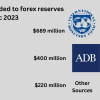Reserves drop to $20b after ACU payment

Bangladesh's foreign exchange reserves fell to $20 billion yesterday from $21.67 billion after the country paid $1.67 billion in regional import bills through the Asian Clearing Union (ACU).
The ACU, a Tehran-based organisation, facilitates payment settlements among nine member countries: India, Bangladesh, Bhutan, Iran, the Maldives, Myanmar, Nepal, Pakistan, and Sri Lanka.
Under the ACU mechanism, Bangladesh clears its import bills every two months, leading to a temporary decline in reserves after each payment.
As of January 8, the country's forex reserves stood at $21.67 billion, calculated in accordance with the International Monetary Fund's (IMF) BPM6 manual.
The central bank has been able to mitigate the sharp decline in forex reserves, particularly since the end of the Awami League-led government's regime on August 5, due to a growing trend in remittance inflows in recent months.
In December last year, Bangladesh received a record $2.64 billion in remittances, the highest monthly remittance inflow in the country's history.
The country's reserves had peaked at a record high of $48 billion (as per central bank calculations) in August 2021 during the Covid-19 pandemic, when imports and economic activity were largely subdued.
However, in the post-pandemic period, reserves began to decline gradually, driven by higher import bills.

 For all latest news, follow The Daily Star's Google News channel.
For all latest news, follow The Daily Star's Google News channel. 










Comments